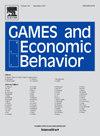Conditional cooperation under uncertainty: The social description-experience gap
IF 1
3区 经济学
Q3 ECONOMICS
引用次数: 0
Abstract
Conditional cooperation is typically studied in experimental settings where the behavior of others is known to subjects. In this study, we examine conditional cooperation under uncertainty. Using a novel experimental design, we exogenously manipulate the likelihood that a subject's partner in a Prisoner's Dilemma will cooperate. Information about the partner's cooperation is either presented descriptively or learned through experiential sampling. We observe a description-experience gap: subjects are more likely to cooperate under experience than under description when their partner's probability of cooperation is low, while the opposite holds when it is 50% or higher. This result contrasts with expectations deriving from the individual choice literature, where rare events are typically underweighted in experience-based decisions. We find that the gap we observe is driven by conditional cooperators being less responsive to social information acquired experientially than to that acquired descriptively. Furthermore, we show that stronger priors held by subjects under social uncertainty compared to individual uncertainty can account for the disparity with the individual choice literature.
不确定条件下的合作:社会描述-经验差距
条件合作通常是在实验环境中研究的,在实验环境中,受试者知道其他人的行为。本研究考察了不确定条件下的条件合作。利用一种新颖的实验设计,我们外生操纵了囚徒困境中被试的搭档合作的可能性。关于合作伙伴合作的信息要么是描述性地呈现,要么是通过经验抽样来学习。我们观察到一个描述-经验的差距:当他们的合作伙伴的合作概率较低时,被试在经验下比在描述下更有可能合作,而当合作伙伴的合作概率为50%或更高时,则相反。这一结果与来自个人选择文献的预期形成对比,在基于经验的决策中,罕见事件通常被低估。我们发现,我们观察到的差距是由条件合作者对经验获得的社会信息的反应不如对描述获得的社会信息的反应所驱动的。此外,我们表明,在社会不确定性下,与个人不确定性相比,受试者持有更强的先验可以解释与个人选择文献的差异。
本文章由计算机程序翻译,如有差异,请以英文原文为准。
求助全文
约1分钟内获得全文
求助全文
来源期刊

Games and Economic Behavior
ECONOMICS-
CiteScore
1.90
自引率
9.10%
发文量
148
期刊介绍:
Games and Economic Behavior facilitates cross-fertilization between theories and applications of game theoretic reasoning. It consistently attracts the best quality and most creative papers in interdisciplinary studies within the social, biological, and mathematical sciences. Most readers recognize it as the leading journal in game theory. Research Areas Include: • Game theory • Economics • Political science • Biology • Computer science • Mathematics • Psychology
 求助内容:
求助内容: 应助结果提醒方式:
应助结果提醒方式:


